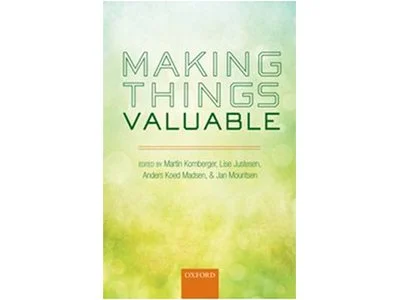CURATED CONVERSATIONS
Making Things Valuable
Stimulates the reader to rethink the contribution of economists and sociologists to the study of valuation
Adds to the important work done within economic sociology during recent decades.
Connects thinking from various disciplines, such as accounting, organization studies and media studies, on a timely subject
Urban Commons
Rethinking the City
The aim of this volume is to twofold, namely (1) to rethink the city on the basis of the notion of the commons, and (2) to readdress discussions of the commons by taking them to the urban domain.
Thinking Infrastructures
This volume introduces the notion of Thinking Infrastructures to explore a broad range of phenomena that structure attention, shape decision-making, and guide cognition: Thinking Infrastructures configure entities (via tracing, tagging), organise knowledge (via search engines), sort things out (via rankings and ratings), govern markets (via calculative practices, including algorithms), and configure preferences (via valuations such as recommender systems). Thus, Thinking Infrastructures, we collectively claim in this volume, inform and shape distributed and embodied cognition, including collective reasoning, structuring of attention and orchestration of decision-making.
Business Ethics as Practice
Representation, Reflexivity and Performance
This book shows that in business, moral questions are not just theoretical; they arise in practice and have to be dealt with in practice. It illustrates that 'ethics as practice' is an important area of study because it focuses on how ethics are enacted and embedded in everyday organizational reality. In contrast to the approaches dominating mainstream literature, the authors of this thought provoking volume focus on the tensions, paradoxes and ambiguities that underpin ethics in practice.
Only ConnecT
Neat Words, Networks and Identities
In a networked economy and society, the connections between individual actors, organizations, and entire industries gain more importance than the entities themselves. As the contributions in this volume suggest, networks develop somewhat fragile identities that emerge through shared practices and language games. From this perspective, networks are an outcome of acts of language use, and their organizational practices unfold in and simultaneously constitute these networks. Providing rich empirical examples ranging from the Louvre to public sector organizations, from Jazz music to German franchising businesses, and, en route, taking in the networks of tacit knowledge in Japanese and Chinese organizations, the book's individual narratives are linked by one common thread: how acts of 'languaging' and heterogeneous practices contribute to the rise, and sometimes fall, of networks and how these networks perform complex tasks shaping organizations and, by extension, us.
Space, Organizations and Management Theory
In this book the relation between architecture, management and organization theory, a relation much under-explored and long overdue for reconsideration, is explored. By looking at processes of organizing from a spatial perspective, the authors reveal interesting insights into how power, culture, change, and identity are embedded, enacted and played out in and through space. Not only do we shape buildings but buildings also shape us. The interaction between how we design our environments, how these environments influence our behavior and by extension, who we are, is the key issue that provides the coherent focus for this volume.




